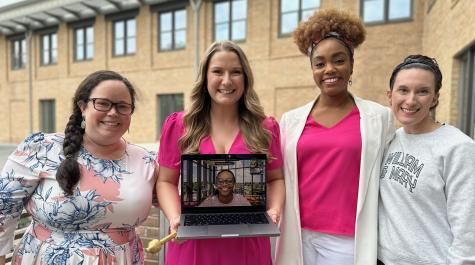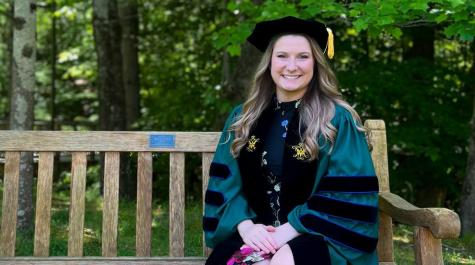Allison Fears Ph.D. '24 earns Thatcher award for trailblazing work in rural school counseling, antiracism and social justice advocacy
The 2024 recipient of the School of Education’s Margaret, The Lady Thatcher, Award for Scholarship, Character and Service is Allison Fears Ph.D. '24 Counselor Education and Supervision. Fears not only models the ideal of actions aligning with values, but for her it’s a guiding principle in her role as an educator, counselor and advocate.
Each year, the student Thatcher Award winner speaks at the School of Education’s Graduation Celebration. This year’s theme of being “magnificent builders” was prominent during both William & Mary’s Commencement Ceremony and the School of Education’s Graduation Celebration. Fears’s remarks to the graduating class added another perspective to this message: sometimes structures need to be torn down before they can be rebuilt.
“When reflecting on the change I wish to see, a lot of it goes back to my own experiences. I hope to see Children of Color and children with marginalized identities celebrated and centered in the schoolwide programming rather than punished for expressing themselves. I hope that we as educators shift our understanding that it's usually not the children's fault, it's actually the system in which they exist, and we seek to dismantle and rebuild those systems,” she said in her remarks.
To cheers from her fellow graduates, she continued: “But in order to do any of this, there has to be a change. There has to be acknowledgement of the wrong that has been done in the systems that are broken. There has to be an understanding that when dismantling systems and seeking to rebuild, there will be pushback and barriers to any type of change because change is uncomfortable to those who benefit from the current systems in place, but it is necessary.”
Fears’s path to delivering these remarks as an award-winning doctoral graduate began in her rural hometown in Charlotte County, Virginia, an area with one high school and a graduating class of 120. As a first-generation college student, Fears was guided by her high school counselor who recognized her interest in psychology, empathy for others and critical thinking skills.
“Most people get into school counseling either because they’ve had a really good experience [with a school counselor] or a really bad one,” she laughs. “Thankfully, I had a good one.”
After completing her master’s degree, Fears began her career in school counseling in rural North Carolina. She found herself deeply passionate about making a difference in the rural setting, cherishing the community’s close relationships and home-like feel, but also recognizing the need for better advocacy for marginalized students. This passion spurred her decision to pursue a Ph.D. in Counselor Education and Supervision.
Despite facing significant challenges during her academic journey, they only fueled her determination to succeed. Fears recalls a time early in her studies when she proposed a fledgling research idea about social and racial justice challenges school counselors face in rural communities, but was told it wasn’t worth pursuing, despite the noticeable gap in current literature. Fears chose to continue the research because of her deep connection to her own experiences, and with the right mentors, this idea eventually evolved into her dissertation. Her research, which utilizes an ecological school counseling framework to identify barriers and develop evidence-based practices, was published in Professional School Counseling, the flagship journal of the American School Counselor Association.
Reflecting on her motivation and balancing numerous responsibilities as a graduate student and assistant professor at East Carolina University (ECU), she says: "I was driven, determined to finish." The supportive environment at ECU, the guidance of her William & Mary faculty mentors, and the support of her cohort were crucial.
Fears thanked her former professor Natoya Haskins Ph.D. ’11, for playing a pivotal role in inspiring her to become the educator she is today. Even after leaving William & Mary, says Fears, Haskins continued supporting her through her academic journey. Clinical Assistant Professor Bianca Augustine and Associate Dean and Director of Diversity & Inclusion Leandra Parris co-chaired Fears’s dissertation committee. They both also significantly influenced Fears, challenging her to improve her research and writing, helping her stay on track, and encouraging her to think critically and produce quality research.
One key technique that Fears adopted from Augustine’s teachings was an acceptance-and-commitment therapy approach. "You ask yourself what brings you closer to your goals and values versus away from them. Then you use that to guide how you fill your time and focus your energy," she explains. This method helped her prioritize and set healthy boundaries, allowing her to focus on what truly matters to her.
During a particularly challenging period in her academic journey, Fears reached out to Clinical Associate Professor Noelle St. Germain-Sehr, who also provided invaluable support and mentorship. This experience taught Fears the importance of creating a sense of belonging and support for others, a theme she has carried into her own teaching and mentoring roles.
Belonging is a core value at William & Mary, and dismantling barriers to a culture of belonging is a focus of the School of Education. Fears’s efforts to cultivate a sense of belonging for others are deeply personal. During her first two years in the doctoral program, she often felt lost and questioned whether she belonged. However, she found her community within her cohort, and they became her support system and held her accountable.
“A lot of people will say be yourself, be authentic, but their actions don’t match,” she observes. As someone passionate about social justice, she often spoke up against inequities, even when it resulted in lost opportunities. This steadfast commitment to her values has been at the heart of her approach to creating inclusive environments.
In nominating her for the Thatcher award, Chair of the School Psychology & Counselor Education Department Denita Hudson describes Fears's mentorship of counseling students: "Allison took the highest level of care in developing these future counselors," said Hudson. "She cultivated community through a culturally sensitive approach to providing feedback and addressing concerns. I witnessed her putting her values into action by creating an antiracist and collegial environment where everyone she worked with experienced a sense of belonging."
Fears closed her remarks with advice to future educators and counselors rooted in her own journey: find your support system, stay true to your values, and be the change you wish to see.
"As we all graduate today and enter our various fields of education, counseling, leadership, there will be many times when you are faced with trials and barriers that leave you questioning if this is really what you want to do in life," she said in her speech. "Your support system is crucial. Surround yourself with those individuals and keep them close because when things get rough or dark, they are the ones who will inspire you to keep going because this is exactly what you are meant to do in life."
